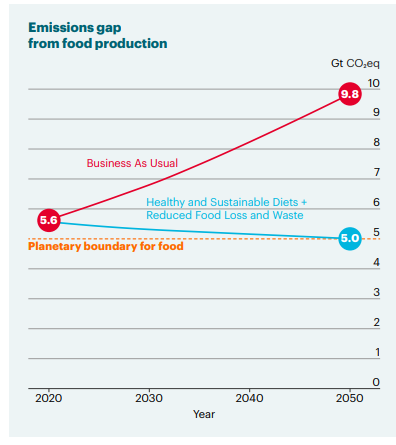Introduction
Food systems hold the key to a healthy planet and a thriving humanity [1]. However, as they currently are, they heavily affect the environment. From deforestation to emissions, they heavily affect the planet [1]. Dietary changes can be a powerful tool to fight climate change, and biodiversity loss and achieve more sustainability [1]. However, sustainable diets are complex and must consider nutrition, environment, affordability, and culture [2].
This summary article, based on a study by the EAT-Lancet Commission and other reliable sources, explores the challenges of sustainable diets. It emphasizes the urgent need to protect ecosystems, adopt sustainable farming, and address waste and malnutrition through dietary choices.
Why Food Matters
Intensive farming practices drive mass extinction, harm ecosystems, and contribute a staggering 24% of global emissions. Yet, despite this significant impact, dietary shifts are often overlooked in sustainability efforts [1].
This paradox continues with millions facing malnutrition or unhealthy diets despite enough food being produced globally. Obesity rates are soaring, with unhealthy dietary choices fueling the rise of non-communicable diseases (NCDs) – a “double burden” of malnutrition disproportionately impacting developing countries [1].
The Food Paradox: Problem and Solution
Embracing sustainable diets is crucial, according to the EAT report, but the road ahead has its bumps. However, inaction paints a grim picture for our future [1] :
- Increased population, same habits = blown climate budget in 2050
- Wealth and urbanization lead to global diet changes: more similar, more animal-derived
- Current trends lead to a future where food creates double the emissions by 2050
-> Science calls for a shift to more plant-based diets, less meat and reduced waste [1].

Making Sustainable Choices: The Role of National Dietary Guidelines
In 2020, dietary patterns within G20 countries were investigated by the EAT. It was concluded that these countries share unhealthy eating habits. National dietary guidelines (NDGs) are roadmaps for improving eating patterns. Despite this, only 100 countries provide NDGs. Furthermore, according to the EAT report [1]:
- Dietary guidance from major health organizations lacks clarity
- NDG updates across countries often lack concrete targets
- Measurable dietary goals are key to tackling health and environmental issues
Balancing Food and Sustainability
The EAT-Lancet Commission reveals: feeding 10 billion requires a global shift towards healthy, sustainable diets [1]. The key lies in a “planetary health diet” (Figure 3) – less meat and dairy, more plants – coupled with more equal food distribution and reduced waste. Science backs this approach: adoption of the planetary health diet can halve emissions by 2030 and achieve planetary health targets by 2050 [3].

The Recipe for Change
To promote healthy and sustainable eating, policies are needed that address individual preferences, cultural influences and affordability [2]. According to the FAO and the EAT-Lancet Commission, these guidelines should be followed to implement sustainable healthy diets [1;2]:
- Dietary guidelines should consider social, cultural, and environmental factors
- Governments should support healthy and sustainable diets in a coherent way
- Representative data can foster optimal dietary shifts and improvements
- Identification of supply-demand mismatches can ensure everyone has access to affordable, desirable meals
Sustainability goes along with Food Safety
Along with other factors, safety considerations should not be overlooked during the transition towards healthy and sustainable diets. Climate change adds another layer of complexity to food safety, especially for low-income countries with limited resources. Balancing the risks and benefits of certain foods is crucial, alongside promoting training to ensure safety isn’t compromised. Furthermore, while plant-based alternatives can benefit health and the environment, they can introduce new risks [2].
Conclusion
Based on the findings of the EAT-Lancet report it can be concluded that [1]:
- Shaping dietary choices can fight climate change
- Plant-based progress needs a boost in G20 countries
- Improved NDGs are a win-win for people and the planet
- Some G20 countries will need bigger cuts in emissions per person than others
- Unique solutions needed: One-size-fits-all can’t work
Sources
- [1] Diets for a Better Future – Scientific Report – EAT Knowledge. (2020, July 16). EAT. https://eatforum.org/knowledge/diets-for-a-better-future/
- [2] Sustainable healthy diets. (2019). In FAO and WHO eBooks. https://doi.org/10.4060/ca6640en
- [3] The Planetary Health Diet – EAT. (2021, April 7). EAT. https://eatforum.org/eat-lancet-commission/the-planetary-health-diet-and-you/
Related articles to Sustainable Food: How to Unlock the Hidden Benefits
Many customers and visitors to this page 'Sustainable Food: How to Unlock the Hidden Benefits' also viewed the articles and manuals listed below:
